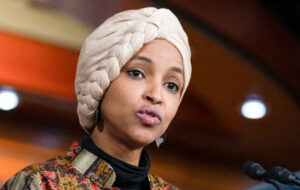
Ilhan Omar Criticizes IMF’s Impact on Kenya
Democratic Representative Ilhan Omar from Minnesota has strongly criticized the International Monetary Fund (IMF) for imposing harsh austerity measures on Kenya. She argues that these policies have significantly increased the cost of living, particularly affecting vulnerable populations.
Omar’s Concerns and Call for Action
In her statement, Omar expressed deep concern over the adverse effects of IMF-mandated austerity on Kenya’s economy. She called for immediate action to alleviate the economic hardships faced by Kenyan citizens.
Impact of IMF Policies
Omar highlighted that IMF austerity conditions often exacerbate social unrest and disproportionately harm the most vulnerable segments of society. She stressed the urgency for addressing these issues to restore economic stability and social harmony.
Criticism of Police Response to Protests
Omar condemned the reported use of excessive force by Kenyan police against protesters. She raised questions about the use of live ammunition and the targeting of journalists, asserting that such actions violate fundamental human rights and undermine Kenya’s democratic principles.
Support for Peaceful Protests
The congresswoman expressed solidarity with Kenyans protesting both IMF austerity measures and police brutality. She underscored the importance of peaceful protest as a constitutional right that authorities must respect.
Omar’s Background and Advocacy
Since her historic election in 2019 as the first African refugee to serve in Congress, Ilhan Omar has been known for her advocacy on social justice issues. She is recognized for her expertise in policy analysis and her commitment to promoting human rights globally.
Kenya’s Economic Challenges Under Ruto’s Administration
Since assuming office in 2022, President William Ruto has sought IMF loans to stabilize Kenya’s economy amidst a severe debt crisis. The latest loan of Ksh.110 billion, received in January 2024, was intended to ease the repayment of Eurobonds due in June 2024.
IMF’s Conditions and Government Response
In exchange for financial assistance, the IMF has required Kenya to implement stringent austerity measures. This includes removing subsidies on essential commodities such as fuel and maize flour, and doubling VAT on fuel from 8% to 16%.
Public Backlash and Economic Strain
The Kenyan public has criticized the government for its perceived extravagance while simultaneously demanding austerity measures that burden ordinary citizens. The economic strain has fueled discontent and sparked protests against the government’s policies.
IMF’s Stance on Kenya’s Economic Challenges
In response to recent protests against the Finance Bill, IMF Communications Director Julie Kozack reiterated their commitment to supporting Kenya through its economic difficulties. She emphasized the IMF’s goal of improving Kenya’s economic prospects and enhancing the well-being of its people.
This ongoing dialogue underscores the complex relationship between international financial institutions, national governments, and the populations affected by economic policies aimed at recovery and stability.


